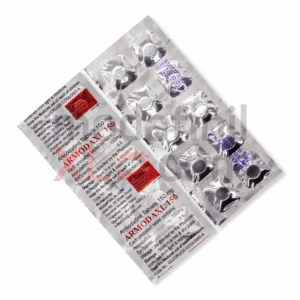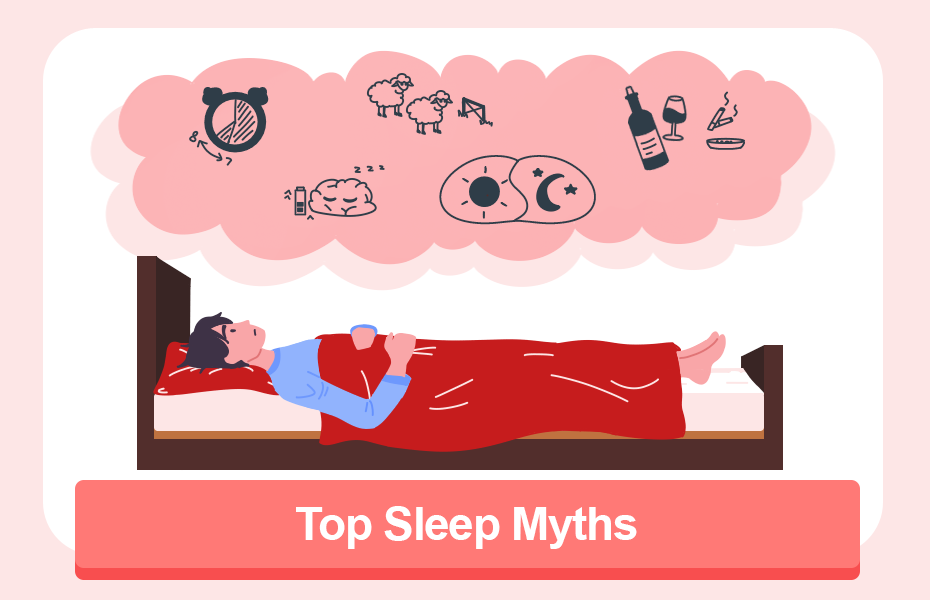Top Sleep Myths
Sleep seems mysterious to most of us. With the age of industry that has brought us artificial lightning, clocks, and fixed work schedules, sleep hygiene is now less observed. We devote more time to everything else that we have to do now and only some segmented time to rest. Modern research gives more information about sleep, which can help us in overcoming sleep deprivation and related disorders.
Seniors Need Less Sleep
There is a common belief that elderly people require less sleep than younger adults. Sleep patterns may change during our life, but sleep needs remain stable. Experts recommend a total amount of rest time of 7-9 hours a day.
Aged people do usually experience fractured sleep patterns because they have a tendency to wake up more often during the night.
As we age, slumber becomes less efficient. It may be a result of various health issues (body aches, etc.) or changes in our circadian rhythm. As older people get less nighttime sleep, they tend to take daytime naps. Thus, the whole amount of sleep stays the same throughout the whole adult life.
You Are Either a Morning Person or a Night Owl
Modern society rewards morning larks and other fans of early morning productivity. The school system states that early awakening contributes to health and wisdom. However, recent studies prove that night owls have the same creativity and productivity as their daytime counterparts.
The situation is linked with individual sleep cycles and different energetic times during the day, not necessarily connected with our slumber preferences. After morning testing of a group of “owls” and “larks,” human trials show no noticeable difference in their mental performance, while at evening testing, larks appear worse at tasks. On the contrary, owls have high productivity in the morning after early awakenings. For better health, most doctors suggest later workday start times.
Naps Make You Feel Better
The very concept of taking a nap is negatively viewed in modern society as something associated with laziness. A cup of strong coffee looks better to perk a nodding person up. However, naps need more respect, as they can really improve our performance in the workplace.
Not all naps are fully restorative, and they depend on how long we nap:
- 10-20 minutes boosts mental alertness and energy;
- 30 minutes causes sleep inertia and groggy feelings;
- 60 minutes is the best for improving one’s health state, but usually comes with groggy feelings.
If adults rest well and long enough at night, they don’t actually need naps. This process is normal in young kids. Famous nappers were Thomas Edison, Albert Einstein, and John F. Kennedy.
Insomniacs Have Difficulty Falling Asleep
Usually, insomnia is associated with difficulty falling asleep. In fact, it can be a symptom of a serious sleep disorder or another psychiatric/psychological or medical problem. Insomnia is also characterized by the following symptoms:
- if you are awake too early in the morning and can’t fall asleep;
- if you are awake too often during the night;
- if you are awake in the morning and don’t feel refreshed.
People may experience daily drowsiness, a sour mood, and decreased work performance. When insomnia occurs several times a week and affects daytime functioning, the problem should be discussed with a doctor and timely treated.
Daytime Sleepiness Is a Sign of Not Enough Sleep
Excessive daytime sleepiness is described as a condition in which a person feels an abnormal drowsiness during the day and has the urge to fall asleep. If this feeling occurs even if you’ve had enough nighttime rest, it can be a sign of sleep disorders (narcolepsy or apnea) or other hidden medical conditions.
Pay attention to your diet, allergies, stress situations, sleep habits, and even medications, which can swallow your energy as well. Daily drowsiness can put people at risk of possible injury while driving or cause diseases that impair one’s emotions or mental abilities.
If kids don’t get enough sleep, they can’t concentrate on tasks, they behave badly, and they get into problems at school. Remember that a good night’s rest needs the right timing, length, and quality. Visit a doctor if you have the described symptoms.
“Cheating” Your Sleep
Scholars recommend nighttime sleep of 7-9 hours as the optimal amount for healthy and safe functioning during the day. If people get fewer slumber hours, such sleep deprivation may result in health problems and lead to obesity, negative behavior and mood, and high blood pressure, as well as safety issues on the road and at home. Our body will never get used to less rest than it needs.
After Wake Up in the Middle of the Night You Need to Stay in Bed
It sometimes happens that we wake up in the middle of the night without being able to sleep again. We toss and turn or start counting sheep hoping to fall back asleep. However, if you don’t succeed in 15-20 minutes, doctors advise getting out of bed.
Go to some other room and occupy your brain and body in some relaxing activity which doesn’t overstimulate you (reading, listening to music, etc.). Don’t switch on a bright light and avoid light emanating from phones, computers, and televisions. Relaxing thoughts and imagery may help to induce sleep faster. One more recommendation is to avoid checking the clock. Get back to bed only if you feel tired and sleepy.
Snoring Is Not Harmful
Snoring is considered a common problem. The National Sleep Foundation states that 32% of adult people in the United States suffer from snoring. Anyway, it is not as harmless as it seems. Aside from bothering other family members, chronic and loud snoring can be a sign of obstructive sleep apnea and can be linked with significant medical problems.
Apnea is associated with pauses in breathing during nighttime rest due to partially or completely blocked airflow. Also, people may often wake at night and gasp for breath. If left untreated, apnea can put additional strain on the cardiovascular system and heart, reducing the level of oxygen. This condition is life-threatening and may provoke a heart stroke/attack or result in high blood pressure.
Snoring is not normal and should be checked out, especially when it is accompanied by daily fatigue.
Alcohol and Smoke Weed Help to Sleep
It seems logical that consuming alcohol before bed helps a person to have a good rest at night because a beer or a glass of wine produce a natural sedative effect. This is true, because it helps us to fall asleep quicker.
However, during the night, ethanol is metabolized in our body and affects the quality of sleep. It makes our sleep lighter and may cause us to wake up in the middle of the night. Alcohol affects the protein channels in the brain, which regulate our dream cycles, and reduces the amount of restorative, deep sleep.
Marijuana makes us feel drowsy, but if taken consistently, it causes strange dreams and troubles with falling asleep.
More Sleep Is Better for Your Health
The amount of sleep for every person is different and changes when we get older. A lot of repose (more than 9 hours) is bound with its poor quality. Try to have better sleep rather than more of it.
A lesser amount of night rest affects our weight and regulation of the hormones ghrelin and leptin. These hormones influence our appetite and control the feelings for when we are full and hungry. If we don’t have enough rest, the level of leptin is decreased, and it doesn’t send impulses to the brain that we are full. The level of ghrelin is decreased, what stimulates our appetite more. Both hormones work for overeating that may result in obesity.
As sleep deprivation is well known for its negative effects on human well-being and health, oversleeping also has adverse effects. Long-sleepers are more often recorded to have a drug dependency or a history of depression. It is also associated with low social and economic status and unemployment.
Teens Need More Sleep Hours
Most children and teens experience unwillingness to leave the comfort of their cozy haven in the morning. Most adults assume that this happens because of their laziness and poor motivation. Scientific research explains this type of behavior as a result of certain biological changes.
Since the time of adolescence, the internal biological clocks keep children awake late at night and prevents them from waking up early in the morning. During puberty, teenagers (mainly males) experience 2-3 hours delay in their circadian rhythms, which makes them more “evening types”. Teens need 8-10 hours of rest, 2 hours more compared to the average time for adults. This is one more recommendation from medical experts to begin classes later in the morning.
Are Health Problems Related to Sleep?
A lot of studies show a correlation between the quality and amount of sleep and health problems. Insufficient rest and poor quality sleep are bound with diabetes, obesity, depression, and arterial hypertension:
- blood pressure varies during sleep cycles and usually decreases at night. Interrupted slumber affects this natural decline and may cause high blood pressure;
- poor and fragmented sleep affects the function of the body to use insulin and may lead to diabetes or provoke its severe forms in patients with this condition;
- insufficient rest lowers metabolism and decreases growth hormone secretion that may increase the chances for weight gain.
Patients with treated sleep apnea and an increased amount of nighttime rest have great improvements in the described illnesses.
Sleep More on Weekends to “Repay Debt”
Let’s assume that we miss out on sleep a couple of hours each night, thus accumulating a sleep debt. One night of adequate rest may help us to be restored and feel refreshed for a while, but these benefits usually last only 6 hours after awakening. If your sleep debt is short-term (10 missed hours during a week), add 3-4 extra hours of slumber to each night on the weekend. If your sleep debt is long-term, then you have to find additional time (for example, vacation) and focus on your repose every night until you can wake up naturally. It will help to get you back on track.
Try not to make a chronic sleep debt. Your reaction time will get slower, which increases the risk of errors or accidents, and also affects your mind’s work.
Brain Rests During Sleep
Earlier, sleep was considered to be an inactive state of our brain and body, a mere absence of consciousness. On the contrary, every night a sequence of important events follow a cyclical, regular pattern. During sleep, we remain still and are unaware that numerous vital processes are going on inside.
Our endocrine system amplifies the production of prolactin and human growth control, which are significant for our immune system. Our brain has no rest and controls various body functions during sleep. For example, its delta waves increase during the night; it regulates breathing, etc. Dreaming is also very important for building neural connections in the brain, where it processes daily information and consolidates long-term memory.
In the night, we drift between the 2 major sleep states of REM (rapid eye movement) and non-REM sleep. REM sleep is a stage of active sleep, when our muscles relax, heart rate increases, eyes move under the eyelids, and where our dreams occur. Non-REM sleep goes through 4 phases starting from drowsiness (phase 1), when we can be easily awakened, to more restorative and deeper slumber (phase 4).
7-8 Hours Sleep per Night Is Enough
Each of us has different sleep needs. The average needs of an adult person are 7-9 hours. Some may need more or less. We know how much we need from our own experience of what we need to feel good the following day. If you want to relax more during the weekend, do not wake up late. You’d better go to bed earlier and take a nap in the afternoon.
Slumber needs are dependent on age factors. For example, newborns need 16 hours of rest each day, adults of 18-64 need 7-9 hours, and older people need 7-8 hours.
Adequate repose and good sleep habits improve our physical and mental health. They activate our brain skills, boost immunity, and repair muscles. If you skimp on rest, you may get depression, heart diseases, and other serious impairments. Of course, there are exceptions to every rule. For example, the former Prime Minister of the UK, Margaret Thatcher, reported that 4 hours of rest per night were enough for her.
Snooze Buys to You More Sleep
It may sound painful to some people, but when you snooze your alarm, it will bring you more harm. A person has no more time to finish sleeping because a deeper part of a sleep cycle is broken. Dozing off between snoozes won’t help. When you get out of bed, you will feel unwell up to the end of the day. A common recommendation is to drag yourself out of bed at once when you wake up.
How to Get Rid of Sleepiness
Thorough sleep research began only in the middle of the 20th century, right after the discovery of REM sleep. Great scientific interest in this phenomenon dispelled a lot of sleep myths, which much contributes to the formation of sleep habits that make us healthier.
People with any sleep problems and abnormalities (insomnia, sleepwalking, narcolepsy, etc.) should seek medical assistance to disclose the actual reason for these conditions and treat them in time. There are lots of medications which alleviate the symptoms of sleep-related disorders and restore a sound slumber process.
ModafinilXL is a professional pharmacy that sells quality drugs for sleep improvement. Armodafinil, Modalert, Modafresh, Vilafinil, Nuvigil, and other generic medicines help to cope with fatigue and excessive drowsiness. The majority of sleep disorders are correlated with mood disorders and may affect cognitive functions if left uncured. Proper and timely treatment with modafinil-containing remedies will repair your sleep, so your mind and body will be restored as well.















